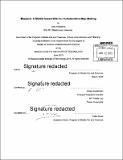Mapjack : a mobile based Wiki for collaborative map making
Author(s)
Ntabathia, Jude
DownloadFull printable version (8.193Mb)
Alternative title
Mobile based Wiki for collaborative map making
Other Contributors
Massachusetts Institute of Technology. Department of Architecture. Program in Media Arts and Sciences.
Advisor
Ethan Zuckerman.
Terms of use
Metadata
Show full item recordAbstract
The internet has enabled people with few or no formal qualifications to create, share and disseminate cartographic information. One of the best platforms that has empowered citizens to create cartographic data is OpenStreetMap. It has been ten years since OpenStreetMap came into existence and despite generating a large corpus of user contributed cartographic data, significant gaps still exist between countries that have poor access to internet and computers and nations that are highly connected digitally. Mapjack is a mobile application that seeks to bring about more contributions by people who have largely been disenfranchised within this realm of volunteered geographic information. Disenfranchised not because they are not willing to participate, but because of the lack of access to tools and devices to participate. Mapjack enables communities to use mobile phones to create and modify their own spatial identities. Spatial identities refer to how communities want to be spatially represented within the digital realm. These spatial identities are maps showing what communities consider as important and fundamental in representing their geographical space therefore forming a spatial digital identity. A team of two communities that are frequent contributors to OpenStreetMap have participated in evaluating the tool. This thesis highlights that the use of offline map rendering and spatial context play a very important role in consumption and contribution to OpenStreetMap.
Description
Thesis: S.M., Massachusetts Institute of Technology, School of Architecture and Planning, Program in Media Arts and Sciences, 2015. Cataloged from PDF version of thesis. Includes bibliographical references (pages 67-68).
Date issued
2015Department
Program in Media Arts and Sciences (Massachusetts Institute of Technology)Publisher
Massachusetts Institute of Technology
Keywords
Architecture. Program in Media Arts and Sciences.